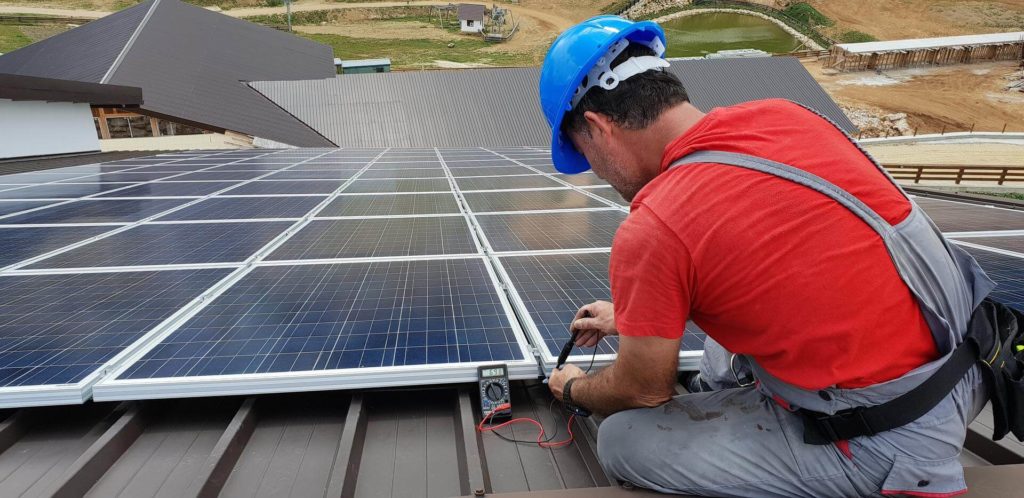
Solar panels are a fantastic way to help save money and the planet. There are many different types of solar panels, so it is crucial that you choose the right one for your home. In this article, we will help you find the best solar panels for your home or business.
Here are the Best Solar Panels Available Today
We have compared the best solar panels in different categories, so that you can make your own choice of the most suitable product for your home or business.
1. LG Solar: Best Overall
LG Solar offers precision-manufactured and market-leading solar panels for businesses and homeowners who demand high performance, reliability, and consistently strong energy yield.
2. Silfab Solar: Editor’s Choice
Silfab Solar is the leading manufacturer of high-efficiency and high-quality monocrystalline solar panels, with a full PV manufacturing process that includes wafers, ingots, R&D, engineering, and product innovation.
3. SunPower: Best Warranties
SunPower provides the only solar and storage solution designed and warranted by a single company, giving customers control over electricity consumption and resiliency during power outages while saving money for homeowners, businesses, governments, schools, and utilities.
4. REC: Advanced Technology
REC Solar is an international pioneering solar energy company that provides clean, affordable solar power to homeowners, businesses, and utilities to facilitate global energy transitions.
5. Winaico Solar Panels: Highly Durable Panels
Winaico is a Taiwan-based solar panel manufacturer known for producing high-quality yet affordable solar panels for residential and small commercial applications. It has been in business since 1991 and has become one of the industry’s most reliable and experienced brands.
6. Panasonic: Top High-End Panels
Panasonic solar panels are one of the most refined tier-one solar panels on the market that beats efficiency and offers higher output energy over time as compared to other high-cost modules of different brands.
7. Canadian Solar: Most Affordable
Canadian Solar manufactures reasonably-priced solar panels for residential, commercial, and utility-scale applications with a good reputation for quality and dependability.
8. Q Cells: Top Customer Service
Q Cells is regarded as one of the solar industry leaders in PV cell technology and innovation and produces a wide range of solar panels designed for residential, commercial, and utility-scale applications.
9. Trina Solar: Great Value Panels
Trina Solar manufactures a wide range of solar panels for residential, commercial, and utility-scale applications, incorporating many of the most recent cell technologies such as bifacial, half-cell, dual glass, PERC, and, more recently, advanced N-type TOPCon monocrystalline cells.
10. Jinko Solar: Superior Efficiency
Jinko Solar is one of the world’s most famous and innovative solar technology companies that covers the core links of the photovoltaic industry chain, focusing on the R&D of integrated photovoltaic products and integrated clean energy solutions.
Which Top Residential Solar Panels Company Should You Choose?
Here is an in-depth look at each solar panel provider, see our pros and cons and make a sound decision:
1. LG Solar
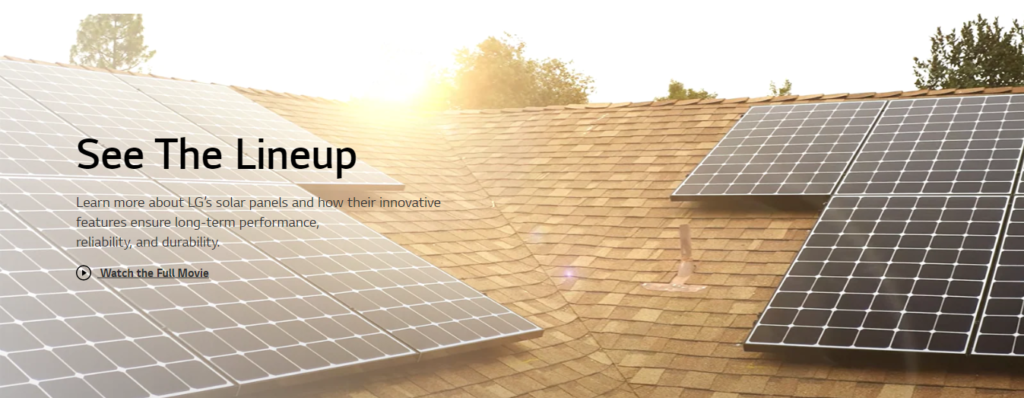
LG has a long history in solar photovoltaics, beginning over 30 years ago when they first began research into crystalline silicon cells. Although more expensive than the competition, LG panels are prevalent and highly rated by customers and solar installers.
Pros
LG Solar has consistently been a market leader in solar panel efficiency. It provides superior performance with high efficiency, excellent warranties, and low-temperature coefficients.
Aside from superior model efficiency, LG Solar offers impressive warranties:
- a 25-year product and power warranty
- a guaranteed power output of more than 90% over 25 years
- an annual power decline of 0.4%
The company’s reputation and years of experience in electronics technology must be considered. You can expect their warranties to be honored well into the future.
Cons
The major disadvantage of LG solar panels is the high price point. LG panels are expensive, ranging from $300 to over $500 per panel. They are also far more costly than their competitors.
From our Experts
While LG offers exceptional quality, you can find less expensive solar panel options that are just as effective at powering your home.
The only reason to choose high-quality brands such as LG over less expensive solar brands that may make more financial sense is if you have a small roof space that requires maximum power output.
You can find top installers for LG solar panels here.
2. Silfab Solar
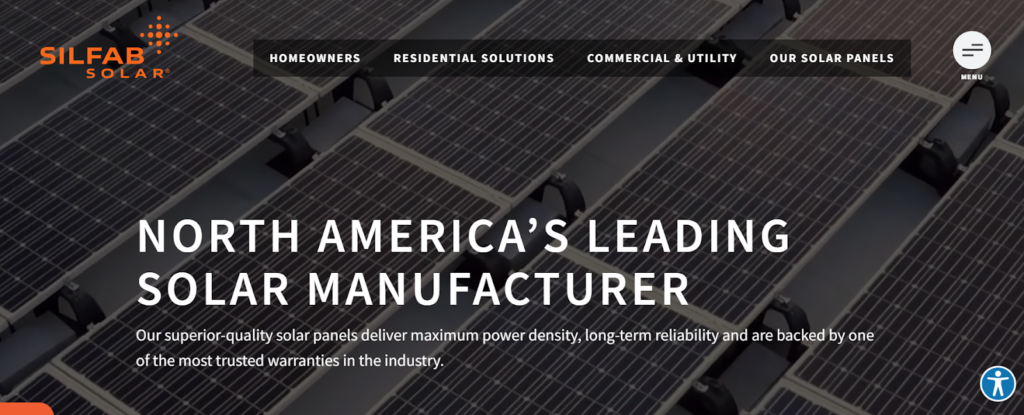
Silfab Solar is a market leader in producing solar panels for residential, commercial, and utility-scale applications. Silfab Solar’s technologically advanced process yields superior reliability. They collaborate with OEM partners to produce PV modules and emerging technology.
Pros
Silfab Solar’s panels are exceptionally durable against snow and wind loads, which means they will last longer than other brands of similar efficiency. They also offer a wide range of sizes, including 14- and 16-cell options and 10-, 12-, and 14-cell options.
The company also offers several different PERC monocrystalline panels that can be paired with various compatible inverters. You can choose between high-efficiency or high-light output for your installation.
Cons
The Silfab Solar are a relatively inexperienced manufacturer but carry a price point closer to premium brands. They also do not offer many mounting locations or mounting heights options. Silfab Solar panels also require the use of a Silfab-certified installer to get the 25-year extended warranty.
From our Experts
We recommend Silfab solar panels to homeowners prioritizing budget, efficiency, and reliability. They provide high-quality modules and have years of industry experience. Silfab incorporates newer solar cell technology into their solar panels to ensure that you receive high-quality products.
If you are looking for medium-sized panels with some of the best performance on the market today, this is an excellent choice.
You can find top installers for Silfab solar panels here.
3. SunPower
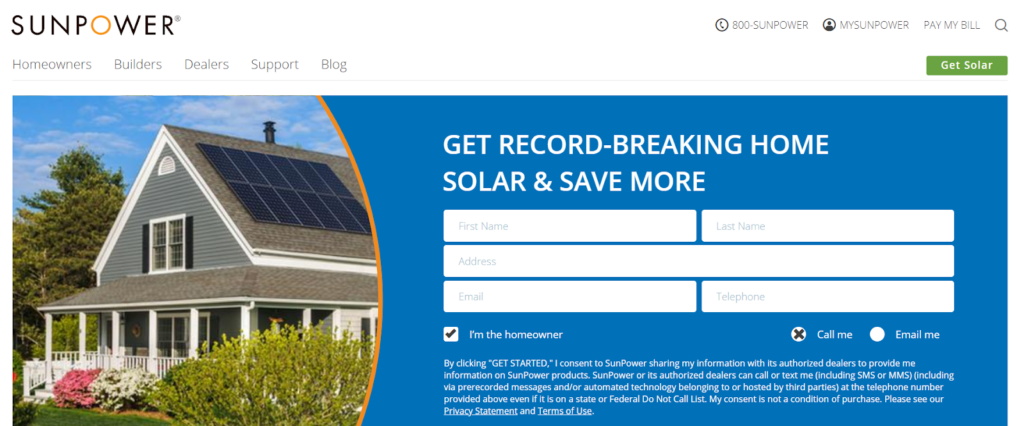
SunPower has been installing solar panels for homeowners since 1985, making it one of the industry’s longest-running providers. Their panels are almost entirely maintenance-free throughout their lifetime and should last far longer than most other panels on your roof.
Pros
SunPower Solar Panels are made with thin-film technology, which gives them a higher efficiency rating than those made with silicon or traditional crystalline panels. Also, SunPower offers products for both commercial and residential applications, including batteries to help store excess energy from the sun during peak times of the day.
In addition, SunPower also provides 25-year product and performance warranties on labor, equipment, and materials for all models sold in North America.
Cons
SunPower limits the availability of its panels to approved installers only. This makes it difficult for homeowners to buy and install their solar panels, which is why SunPower is a famous brand among professional installers.
From our Experts
SunPower provides a variety of panels with varying specifications, prices, and warranty options. If you are interested in SunPower solar panels, we recommend first visiting their website to determine which model is best for your home’s needs.
You can find top installers for SunPower solar panels here.
4. REC
4. REC
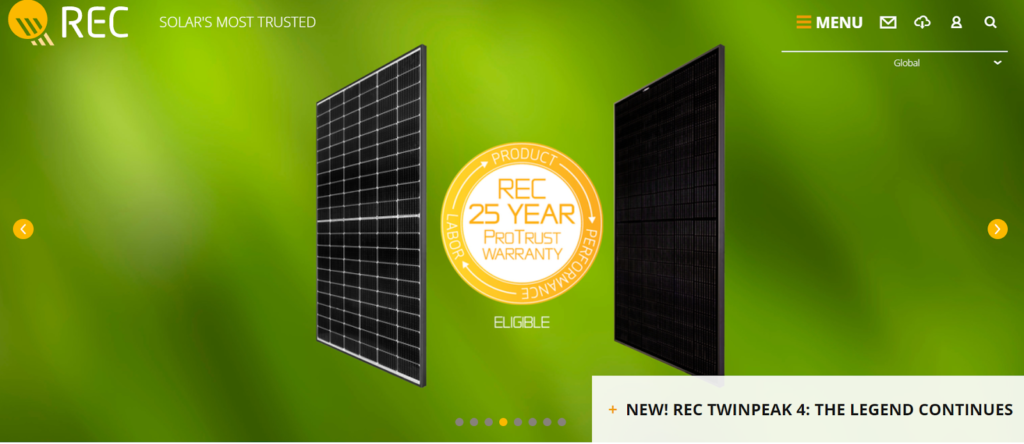
REC Group is a top-tier solar brand with a long history of innovation in manufacturing high-power solar equipment. They manufactured thirty-eight million solar panels, produced ten gigatons of solar energy, and provided solar power to more than sixteen million people since its founding in 1996.
Pros
RECs panels are among the most dependable on the market, and they have a high-power rating, producing up to 6.5 kW of energy over their lifetime.
Cons
The major disadvantage of REC Solar is that it can be more expensive than average. Although this might not be a problem for homeowners, it may affect those with limited budgets or renters.
Some people have difficulty installing REC Solar panels in their homes because they require more space than other solar panels.
From our Experts
REC solar panels are an excellent choice. If you want a high-quality panel that will power your home for years, REC panels are the way to go.
Another reason to choose REC is that you can rely on them to provide customer service if you need to use the panel warranty.
You can find top installers for REC solar panels here.
5. Winaico
5. Winaico
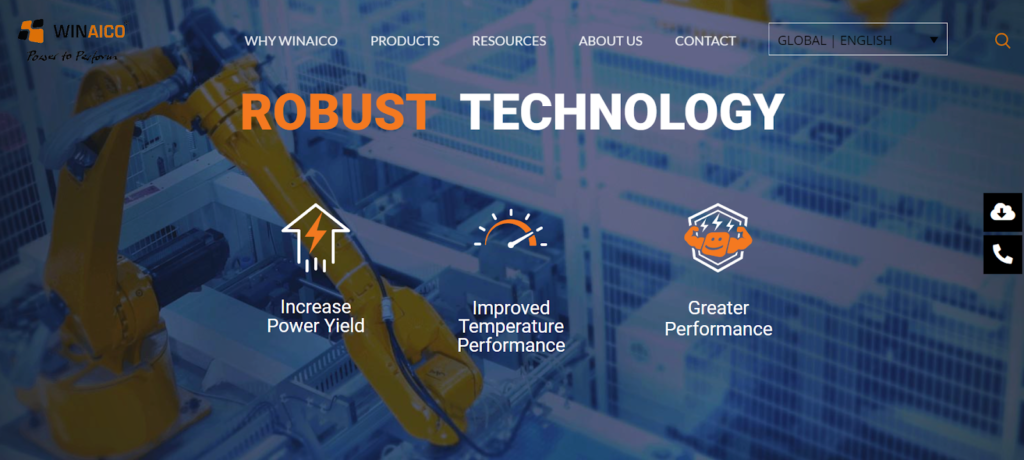
Winaico has been around for more than ten years and is one of the leading suppliers of high-efficiency solar panels to the USA market. They were one of the first companies to introduce such products in North America in 2006. Winaico focuses on quality, service, and producing durable, high-strength solar panels backed by a 25-year product warranty.
Pros
The main advantage of Winaico solar panels is that they are highly efficient and durable. The degradation rate of these solar panels is impressive, which means that they will work for a long time without losing their efficiency levels.
Winaico solar panels also have a patent on their water drainage system, allowing water to flow away from the solar panel without affecting its performance levels. It makes them more efficient than other brands of solar panels that use metal frames instead of plastic ones.
Cons
There are several reasons why Winaico solar panels are not as popular as other solar panel brands:
- cost is high compared to other popular brands,
- have a limited market presence in the United States and Europe, and
- manufacturing volumes are low.
From our Experts
Winaico solar panels are a significant investment even though they are not the most expensive brand on the market. They guarantee that its panels will retain at least 80% of their original yield even after 25 years of continuous use, as do other companies in its class. It may take a few more years to break even and begin profiting, but it’s a win-win situation!
You can find top installers for Winaico solar panels here.
6. Panasonic
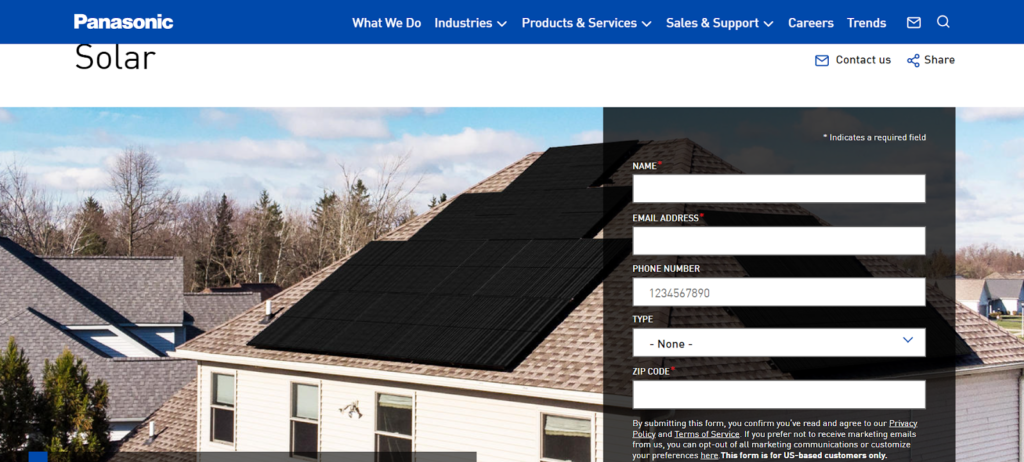
Panasonic is a well-known consumer brand that has become a high-quality leader in solar cell technology for over 30 years. They produce the best solar panels in the world due to their state-of-the-art manufacturing facilities in Japan and their commitment to quality.
Pros
Panasonic produces solar panels with a high-efficiency rating. They are also very durable. After 25 years, you still have more than 90% of the initial power output.
Panasonic modules come in several sizes and configurations, including mono or polycrystalline models with different cell counts. These can be combined with mono or polycrystalline inverters to create an ideal system for your home or business needs.
Cons
While Panasonic panels are modern, their efficiency is not exceptionally high compared to their price. Panasonic solar panels are also pricey, ranging from $1 to $1.2 per watt. These are not the most expensive photovoltaic modules on the market – LG and REC are at the top – but they are up there.
From our Experts
Panasonic panels are an excellent choice if you install a high-quality, reliable solar system without giving up your life’s savings.
So, if you are dead set on getting the Panasonic brand and want to ensure the best quality possible, you should consider going solar sooner rather than later.
You can find top installers for Panasonic solar panels here.
7. Canadian Solar
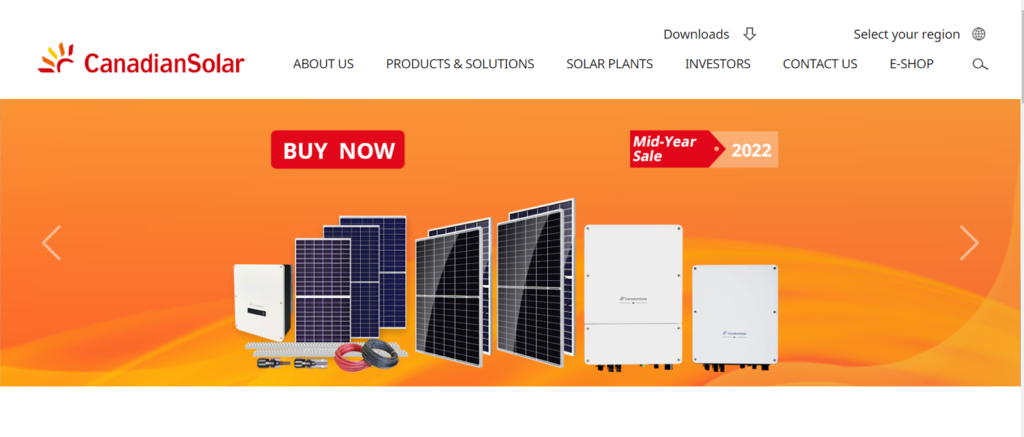
Canadian Solar is a leading manufacturer of solar modules and panels for residential, commercial, and large-scale power generation systems. Its primary business is manufacturing and selling solar photovoltaic (PV) systems through its sales force and third-party installers.
Pros
The company has been operating for over 20 years, and its solar panels are made of durable, high-quality materials that can withstand any weather conditions.
Most Canadian solar panels are polycrystalline, which means they are more efficient than monocrystalline models at producing electricity from sunlight. Polycrystalline panels are also less expensive than monocrystalline panels because they require less manufacturing labor and thus cost less to build.
Cons
The main disadvantage of Canadian Solar panels is that they are not suitable for small roofs. Also, they perform poorly in hotter climates because they lose efficiency when it is hot outside. The company doesn’t provide as many warranties as to other brands for their basic panel options.
From our Experts
Canadian Solar may be your best option if you want to secure some decent solar panels at a lower price. This company makes high-quality panels that are not too far off from the industry leaders concerning efficiency, temperature coefficient, and other technical considerations.
You can find top installers for Canadian solar panels here.
8. Q Cells
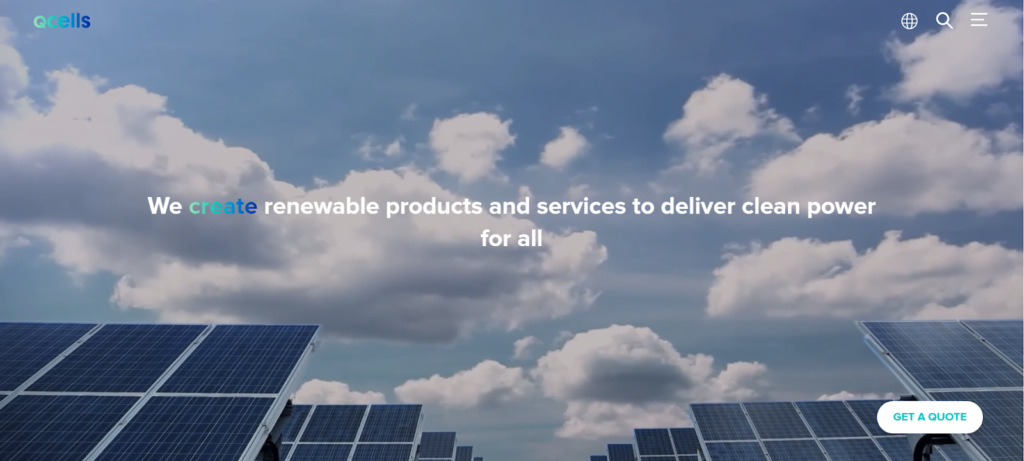
Q Cells is a leading manufacturer of solar panels and modules. The company has been involved in the photovoltaic industry for over 20 years and has become one of the world’s largest manufacturers of high-quality solar products.
Pros
Q Cells is an excellent option for homeowners with smaller budgets, as it offers high-quality, excellent performance panels at an affordable price. In addition, they have a 25-year product and performance guarantee, which means that you can be sure that your solar panels will last for many years to come.
Cons
Q Cells solar panels use one type of technology, which means if you want to add more panels later down the road, you’ll have to use another type of technology like photovoltaic cells or thin-film solar panels.
From our Experts
Q Cells produces some of the best all-around solar panels on the market. They are a good option for homeowners looking for solar panels that are less expensive but provide high-quality performance.
You can find top installers for Q Cells solar panels here.
9. Trina Solar
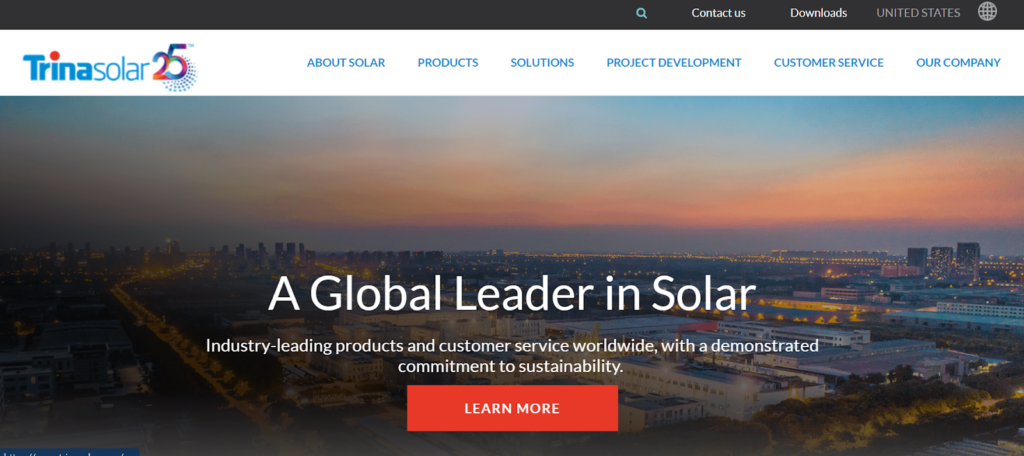
Trina Solar is one of the world’s largest solar panel manufacturers. They are well-known for producing cost-effective, reliable solar panels for various applications, and are innovative.
Pros
Most Trina Solar products offer extraordinarily modern and highly efficient output modules with more than 400W power. Trina engineers push solar technologies forward and are not afraid to incorporate new ideas into their panels. As a result, with a 21.6 percent energy conversion rate, Vertex is one of the most efficient panels on the market.
Cons
If you are looking for modules for your home, choices are limited. Trina Solar emphasizes panels for systems of commercial and industrial scope.
Trina Solar also had quality issues with panels manufactured between 2011 and 2014. Panels suffered from Potential Induced Degradation (PID), water ingress, and backsheet degradation.
From our Experts
Trina Solar is an excellent choice for home solar panels based on their high-quality craftsmanship, company longevity, and financial health. They also offer a great warranty and high-performing panels. Solar panels from Trina are a great choice.
You can find top installers for Trina solar panels here.
10. Jinko Solar
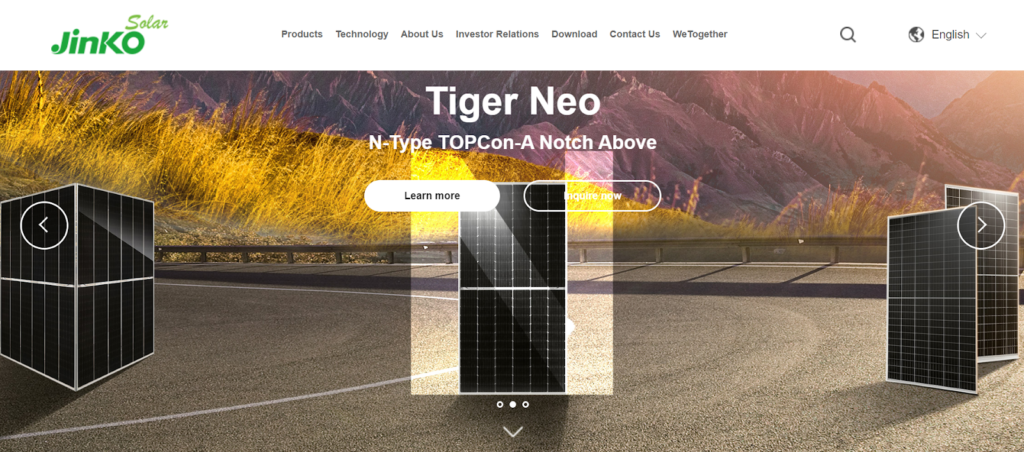
Jinko Solar is one of the world’s largest manufacturers of solar panels, with a proven track record of producing cost-effective, dependable solar panels for residential and commercial applications. Their new Tiger series panels are pushing the transition to higher-performance N-type cells.
Pros
Jinko Solar owns the entire production process, from making the silicon ingots to assembling the panels. It means they can have tight controls over every aspect of manufacturing, ensuring they get high-quality raw materials at a reasonable price.
Cons
Jinko offers relatively weak warranties. The product and performance warranties fall well behind the coverage offered by top premium brands.
From our Experts
Jinko Solar Panels strike a good balance between a reliable and reputable brand and affordability. Jinko has a good selection of panels, including the affordable Cheetah Series and the premium Tiger Series.
You can find top installers for Jinko solar panels here.
How Did We Select the Best Solar Panels for Your Home?
When looking for the best solar panels for your house, there are many things to consider. Our methodology for choosing the best panels for your home use are as follows:
1. Cost/Payment Plans
The first thing you’ll want to consider is how much you are willing to spend on a solar system. We also look at the costs of installing a solar panel system in your home, including labor and equipment costs, financing, permitting fees, and taxes. Finally, we also look at what kind of payments you can get with each system and how much money you’ll save over time by going solar.
2. Durability
Before selecting a solar panel, you should consider how long it will last before needing to be replaced or repaired. The most durable solar panels are made from high-quality materials like aluminum and glass, making them more resistant to damage and rust than other materials used in their production.
3. Efficiency
The efficiency rating of a solar panel is one of the most important aspects to consider when buying a solar panel. The higher the efficiency rating, the more energy a panel can produce.
4. Warranties
Panel warranties vary widely from company to company, but we wanted to ensure that our panel selection had a warranty better than those offered by most solar companies. You’ll want to get the best warranty that lasts the longest.
5. Coefficient (C-Rating)
The C-Rating is an industry-standard measure that indicates how efficiently each panel converts sunlight into electricity over its lifetime. The higher the C-rating or power generation capability of a solar panel, the more electricity it can generate per unit of surface area.
6. Customer Service
Good customer service is essential for consumers. Solar panels that have poor customer service are likely to fail faster and cost more in the long run than those with good customer service.
What Types Of Solar Panels Would Work Best For Homeowners?
First, let’s ask the question, what are solar panels made of? Solar panels are available in a variety of types and designs.
- Monocrystalline Solar Panels: These are the most common type of solar panels on the market today. They are made from single-crystal silicon wafers that have been cut into sheets or ribbons and then laminated.
- Polycrystalline Solar Panels: Polycrystalline solar panels are cheaper than monocrystalline solar panels because they use less material in their production process. However, they do not produce as much electricity per square foot as monocrystalline panels since they do not have as many layers of cells.
- Thin-film Solar Panels: These are made of a combination of silicon carbide and copper indium gallium selenide (CIGS) that can be produced with much less labor and cost than other solar panels. They can also be used in applications like roofing shingles.
Those are three main types of solar panel technology that you’ll find in solar panels today.
But How Do Solar Panels Work?
How do solar panels work in my house? Solar panels absorb sunlight with photovoltaic (PV) cells that then convert sunlight into direct current (DC) energy, which travels inside the house to an inverter. The energy is converted to alternating current (AC) energy that then flows through the home’s electrical panel and powers any appliances.
How does it Work at Night?
Technically, solar panels do not produce energy at night. Solar panels produce electricity from the sun all day and they also support sustainable solar energy solutions at night. You can continue benefiting from their energy production after sunset through net metering and solar battery storage.
Best Solar Panels FAQs
What factors affect the solar panel system array?
The size of your solar panel system array is determined by several factors, including the amount of sunlight available in your area, your roof’s orientation to the sun, and even how tall your roof is. The larger the array size, the more energy it will generate.
How big can the solar panels get? How small can they be?
The size of the solar panels depends on what you need them for. For example, you may only need one or two panels if you have a small home. On the other hand, you may want to consider installing multiple panels if you have an industrial building or large farmhouse.
Do solar panels work in any weather?
Solar panels work well in all types of weather except below freezing temperatures.
Do I have to own a house to place the panels?
You do not have to own a house to install solar panels since you can sign up for a rooftop solar loan. The main reason people sign up for these loans is that they want the flexibility of being able to move the system when they want.
Can I get incentives and tax breaks/deductions or rebates?
Incentives vary from state to state, but many states offer some incentives for installing solar panels. Also, federal tax credits are available in all 50 states.
What is the best way to clean solar panels?
Solar panels need to be cleaned regularly and at least once a year. The easiest way to clean your solar panels is by wiping them with a damp cloth or sponge. Do not use chemicals or other fluids on your solar panels as this can damage them and cause corrosion.
Is there a difference between residential and commercial solar panels?
There isn’t much of a difference between residential and commercial solar panels. Residential solar systems are intended for household use only, while commercial systems can also be used for business purposes.
Where is the best place to buy solar panels?
You should always check out local companies before buying your solar system to determine whether they offer good customer service, high-quality products, and competitive prices.
How much do solar panels cost?
The price for a solar panel system can range from about $4,000 to $20,000 depending on how many panels you want, where they’ll be placed, and what financing options you plan to use.
How long do solar panels last?
Solar energy systems should last 10-15 years, depending on how well they were maintained and cared for during their lifetime.
How many solar panels do I need?
The best way to determine how many solar panels you need is by looking at your roof. It is generally better to install more solar panels than less because each panel produces less power than the next one.
Is it worth it to install solar panels?
The simple answer is yes. Solar panels are an excellent investment for your home; they pay for themselves in less than ten years. If you’re interested in saving money on your electric bill, installing solar panels is worth it.
Conclusion: Which Are the Best Solar Panels For Your Home Installation?
There are many varieties of solar panels. Each model has advantages and disadvantages that should be considered when planning your home installation. After reading this article, you should feel more educated and confident in your choices.
Are you still undecided after reading this article on what solar panel to choose? We can help you make things more straightforward. Contact us for more solar panel reviews!